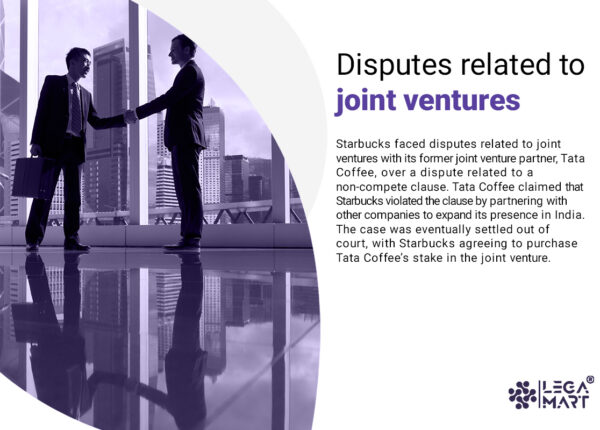
Starbucks faced disputes related to joint ventures with its former joint venture partner, Tata Coffee, over a dispute related to a non-compete clause. Tata Coffee claimed that Starbucks violated the clause by partnering with other companies to expand its presence in India. The case was eventually settled out of court, with Starbucks agreeing to purchase Tata Coffee’s stake in the joint venture.
The dispute led to Tata Coffee filing a legal notice to terminate their agreement with Starbucks following disputes related to joint ventures.
The case was settled out of court, with Starbucks agreeing to purchase Tata Coffee’s 50% stake in the joint venture. The Starbucks-Tata Coffee dispute illustrates the importance of clear and well-defined agreements in joint ventures, particularly when it comes to non-compete clauses. It also highlights the potential for disputes to arise when joint venture partners have conflicting interests or strategies. Businesses that engage in joint ventures.
The Starbucks and Tata Coffee legal battle has made us realize the importance of well-drafted and well-defined agreements, irrespective of whether they relate to clauses in use during the term of the agreement, or even afterwards.
When it comes to non-compete clauses, they act as good safeguards for a business, considering that it helps provide exclusivity to the parties to the agreement. The non-compete clause present between Starbucks and Tata Coffee was used to prevent them from partnering with other companies, or to prevent them to look for other ways of expanding their respective businesses in India.
These clauses help in protecting investments and trade secrets that might be shared between the parties, and also prevents the further creation of competition in the market. While the non-compete clauses are mostly used in cases when a business is sold, however, in the present case, considering that the parties entered into a joint venture with each other, it meant that they gain access to each other’s confidential and proprietary information over the course of employment. Therefore, it was essential to protect their respective trade secrets, especially considering that such sensitive information was capable of being used for the wrong purposes.
However, Starbucks decided to not adhere to the non-compete clause and instead tried to partner with other companies for faster expansion in India. While the parties eventually chose to settle the matter, however, if the settlement had not occurred, and Tata Coffee went ahead with the lawsuit, it could result in several consequences for Starbucks. Violation of non-compete clauses can result in Starbucks being liable to pay monetary damages to Tata Coffee, based on the actual losses suffered by Tata Coffee due to such arrangements.
It would also be easy for Tata Coffee to get an injunction from the court, considering that the additional profits being made by Starbucks would be the result of an arrangement which is barred by their agreement with Tata Coffee. This could eventually lead to a lot of losses for Starbucks, not just with their partners, but within their overall business as well. In addition to the legal causes, the said situation also results in the parties having bad relationships with each other, which might cause problems later within the competitive market.
Therefore, it is recommended for the businesses to adhere to non-compete clauses, and if they have even an iota of doubt of not being able to adhere to such clauses in the future, they should avoid including them within the final agreements.
This is because once the agreement has been signed, the parties become bound by the defined clauses of the agreement, and hence, the more well-defined the clauses within the agreement are, the less chances exist for any conflict or dispute between the parties in the future, considering that both the parties involved shall have a common interpretation of the clauses. Therefore, ensure that clauses are well-drafted in the agreements through the common meeting of minds of the parties involved by hiring an experienced contract drafting lawyer!




